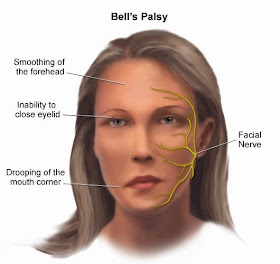Bell's palsy is a form of temporary facial paralysis resulting from damage or trauma to one of the facial nerves. It is the most common cause of facial paralysis. Generally, Bell's palsy affects only one of the paired facial nerves and one side of the face, however, in rare cases, it can affect both sides. Symptoms of Bell's palsy usually begin suddenly and reach their peak within 48 hours. Symptoms vary from person to person and can range in severity from mild weakness to total paralysis. These symptoms include twitching, weakness, or paralysis, drooping eyelid or corner of the mouth, drooling, dry eye or mouth, impairment of taste, and excessive tearing in the eye. Bell’s palsy often causes significant facial distortion. Most scientists believe that a viral infection such as viral meningitis or the common cold sore virus -- herpes simplex-- can cause the disorder when the facial nerve swells and becomes inflamed in reaction to the infection.
Treatment
Recent studies have shown that steroids such as prednisone -- used to reduce inflammation and swelling -- are an effective treatment for Bell's palsy. Other drugs such as acyclovir -- used to fight viral herpes infections -- may also have some benefit in shortening the course of the disease. Analgesics such as aspirin, acetaminophen, or ibuprofen may relieve pain. Because of possible drug interactions, individuals should always talk to their doctors before taking any over-the-counter medicines. Keeping the eye moist and protecting it from debris and injury, especially at night, is important. Physical therapy to stimulate the facial nerve and help maintain muscle tone may benefit some individuals.
Prognosis
The prognosis for individuals with Bell's palsy is generally very good. The extent of nerve damage determines the extent of recovery. With or without treatment, most individuals begin to get better within 2 weeks after the initial onset of symptoms and recover completely within 3 to 6 months.
Courtesy: NINDS
Treatment
Recent studies have shown that steroids such as prednisone -- used to reduce inflammation and swelling -- are an effective treatment for Bell's palsy. Other drugs such as acyclovir -- used to fight viral herpes infections -- may also have some benefit in shortening the course of the disease. Analgesics such as aspirin, acetaminophen, or ibuprofen may relieve pain. Because of possible drug interactions, individuals should always talk to their doctors before taking any over-the-counter medicines. Keeping the eye moist and protecting it from debris and injury, especially at night, is important. Physical therapy to stimulate the facial nerve and help maintain muscle tone may benefit some individuals.
Prognosis
The prognosis for individuals with Bell's palsy is generally very good. The extent of nerve damage determines the extent of recovery. With or without treatment, most individuals begin to get better within 2 weeks after the initial onset of symptoms and recover completely within 3 to 6 months.
Courtesy: NINDS

